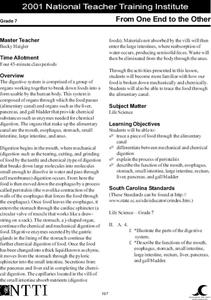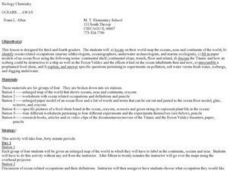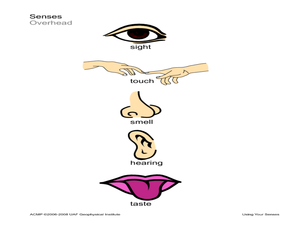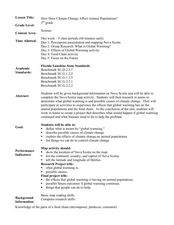Curated OER
Ocean Exploration
Students explore whales. In this animal adaptation and whale instructional activity, students access prior knowledge about whales from previous lessons, then use background knowledge to predict the eating strategies of a baleen whale and...
Curated OER
From One End to the Other
Seventh graders trace a piece of food through the digestive system. They describe the functions of the mouth, esophagus, stomach, etc.
Curated OER
Many Uses of Plants
Students research and discuss non-food plant products that are in common use, and mark on a world map the name of the country where the plant is grown.
Curated OER
Micronutrient Need Intervention
Students investigate the real world applications of nutrition. They study the problem of starvation and how it affects different populations. Students work in small groups in order to devise and intervention plan. They also search out...
Curated OER
Ecosystem Interactions in Refuges
Seventh graders, using national parks as models, illustrate the energy flow in ecosystems. Working in groups, they use murals, flow charts, or other visual displays to record their findings. Students represent the food chains and webs...
Curated OER
What Teeth Tell Us
Young scholars view pictures of a variety of animals. They examine the animals' teeth and discuss the differences in them. They experiment with staple removers (carnivore teeth) and two flat rocks (herbivore teeth) and determine which...
Curated OER
From One End to the Other
Seventh graders trace a piece of food through the alimentary canal and differentiate between mechanical and chemical digestion in several different hands-on activities related to digestion.
Curated OER
4-H Companion Animal Project
In this 4-H animal science learning exercise, students will complete several activities about companion animals. Students will learn about feline feelings, dog breeds and their different groups, rabbit vocabulary and ideas for service...
Curated OER
Diffusion of Molecules
Students conduct a series of experiments to observe factors that impact molecular movement. In this molecular chemistry lesson, students drop food coloring in water with different properties (hot, with ice, with alcohol) and observe how...
Curated OER
The Unmixables: Investigating Immiscible Liquids
Students build an understanding of the properties of liquids and research the immiscible properties of different milks through group experiments. For this immiscible liquids experiment, students investigate what happens when certain...
Curated OER
Frozen, Canned or Fresh?
Students compare spinach. In this Science lesson, students construct an experiment to test fresh, frozen, and canned spinach taste and texture. Students record their findings in charts and graphs.
Curated OER
Biological and Agricultural Engineering
Eighth graders explore mathematics by conducting a series of investigations using a colorimeter. In this math lesson, 8th graders explain the purpose of food irradiation. They collect data and graph them.
Curated OER
Ocean Life
Students explore the topics of ocean water salinity, ocean life zones, marine life classification, and ocean food chains. They observe demonstrations, conduct experiments, complete quizzes and handouts, and analyze key vocabulary.
Curated OER
Solids, Liquids and Gases
Students are introduced to the various states of matter. After watching a video, they discover how to compare the three states using its shape and volume. In groups, they participate in an experiment with solids, liquids and gases and...
Curated OER
Oceans Away
Students explore oceans. In this science lesson plan, students locate oceans, seas and continents of the world, identify ocean-related occupations, and complete activities pertaining to food chains as well as pollution.
Curated OER
Composting Conundrum
Students research cafeteria composting. In this composting lesson, students design a vessel that would allow the cafeteria staff to collect food scraps for composting. Then students build a prototype and present it to the class. Lastly...
Curated OER
Using Your Senses
Students make observations. In this sensory skills instructional activity, students use their senses as well as tools that sharpen their senses to make observations regarding foods and other items.
Curated OER
How Does Climate Change Affect Animal Populations?
Students investigate the effect of climate change on animal population in Nova Scotia. In this environmental science lesson, students complete a Nova Scotia map activity and research the causes of global warming in small groups. Students...
Curated OER
Don’t Cry Over Spoiled Milk!
Seventh graders explore how milk spoils over time. In this biology lesson plan, 7th graders discover how pH changes as microorganisms enter the food and multiply. They explain the benefits of pasteurization process.
Curated OER
What Would Halloween be Like Without the Ecuadorian Rainforest?
Fourth graders are given a number of typical Halloween treats and work in groups to determine which foods came from the Rainforest (chocolate) and which foods came from temperate regions (apples, popcorn) and treats that don't have...
Curated OER
Nutrition: It's In Your Hands
Fourth graders use this lesson to focus on their health, nutrition and the state of the environment. In groups, they examine the various types of land, water and air pollutants and compare and contrast a food chain with and without a...
Curated OER
Take an Ant to Lunch
Second graders construct a model of an ant, exemplifying that ants are insects. Students gather data create a pictograph chart to show ant food preferences. Also, 2nd graders access the Internet to explore ant eating habits.
Curated OER
Ice Energy
Students study the concept of ice energy. For this ice energy lesson, students observe what happens when salt is sprinkled on a piece of ice before following a recipe to make two types of ice cream. They note the difference in the two...
Curated OER
Watch Me Grow
Learners observe that plants need air, food, light, and water to survive. In this plant biology lesson, students observe the growth and development of two plants, one is the control plant and the other is denied either air, water, or...

























